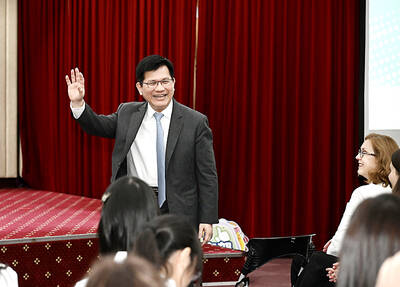An ophthalmologist warned people against using their smartphones in the dark for extended periods after a teen was diagnosed with acquired “red-green color blindness.”
Hung Chi-ting (洪啟庭), an ophthalmologist with Fooyin University Hospital in Pingtung County, on Sunday said that last month he treated a 16-year-old girl who came to him complaining about her inability to distinguish the colors of traffic light.
Hung quoted the girl, surnamed Liu (劉), as saying that after summer vacation, she had had several risky encounters when crossing the street.

Photo courtesy of Hung Chi-ting
It was only when she was out walking with her family that they noticed that she mistook the red light for green, Liu said.
She also experienced a deterioration in her ability to see in the dark, Hung said.
Whereas it used to take her about 25 minutes for her eyes to adapt and be able to distinguish things in a dark room, now it takes her about an hour, he quoted Liu as saying.
After checking her vision, Hung said that there were no signs that Liu’s nearsightedness had worsened, as it remained at 4 diopters.
Neither did she have glaucoma, cataracts, retinal detachment, hypertension, nor a family history of other rare diseases, he added.
Liu said that since the beginning of summer vacation, she had not spent a minute away from her smartphone, adding that she would turn off lights in her room and use her phone in bed, averaging about 10 hours of screen time each day.
Hung said that if rod cells (responsible for vision in low-light conditions) and cone cells (responsible for vision in bright light and color sensing) are under oxidative stress caused by long-term exposure to blue light, free radicals and reactive oxygen species — both of which attack and damage cells — would appear around the multilayer cells of the retina.
That is what causes acquired color blindness and impaired dark adaptation, Hung added.
Fortunately, Liu’s condition was in the early stage and she has stopped using her smartphone, Hung said, adding that her vision has recovered.
Congenital color blindness is untreatable, and the red-green color blindness would have deteriorated and became complete color blindness had the girl not been treated early, Hung added.
People should not use their smartphones for more than five hours a day and take 10-minute breaks every 30 minutes, he said.
Gazing at distant objects can soothe eye strain, while staring at the phone with the lights off is not recommended, as blue light damages eye cells even more in the dark, he added.

FIREPOWER: On top of the torpedoes, the military would procure Kestrel II anti-tank weapons systems to replace aging license-produced M72 LAW launchers Taiwan is to receive US-made Mark 48 torpedoes and training simulators over the next three years, following delays that hampered the navy’s operational readiness, the Ministry of National Defense’s latest budget proposal showed. The navy next year would acquire four training simulator systems for the torpedoes and take receipt of 14 torpedoes in 2027 and 10 torpedoes in 2028, the ministry said in its budget for the next fiscal year. The torpedoes would almost certainly be utilized in the navy’s two upgraded Chien Lung-class submarines and the indigenously developed Hai Kun, should the attack sub successfully reach operational status. US President Donald Trump

Taiwan Semiconductor Manufacturing Co (TSMC, 台積電) is expected to start construction of its 1.4-nanometer chip manufacturing facilities at the Central Taiwan Science Park (CTSP, 中部科學園區) as early as October, the Chinese-language Liberty Times (the Taipei Times’ sister newspaper) reported yesterday, citing the park administration. TSMC acquired land for the second phase of the park’s expansion in Taichung in June. Large cement, construction and facility engineering companies in central Taiwan have reportedly been receiving bids for TSMC-related projects, the report said. Supply-chain firms estimated that the business opportunities for engineering, equipment and materials supply, and back-end packaging and testing could reach as high as

ALL QUIET: The Philippine foreign secretary told senators she would not respond to questions about whether Lin Chia-lung was in the country The Ministry of Foreign Affairs on Wednesday confirmed that a business delegation is visiting the Philippines, but declined to say whether Minister of Foreign Affairs Lin Chia-lung (林佳龍) is part of the group, as Philippine lawmakers raised questions over Lin’s reported visit. The group is being led by Deputy Minister of Agriculture Huang Chao-chin (黃昭欽), Chinese International Economic Cooperation Association (CIECA) chairman Joseph Lyu (呂桔誠) and US-Taiwan Business Council (USTBC) vice president Lotta Danielsson, the ministry said in a statement. However, sources speaking on condition of anonymity said that Lin is leading the delegation of 70 people. Filinvest New Clark City Innovation Park

DEFENSIVE EDGE: The liaison officer would work with Taiwan on drones and military applications for other civilian-developed technologies, a source said A Pentagon unit tasked with facilitating the US military’s adoption of new technology is soon to deploy officials to dozens of friendly nations, including Taiwan, the Financial Times reported yesterday. The US Department of Defense’s Defense Innovation Unit (DIU) is to send a representative to collaborate with Taiwan on drones and military applications from the semiconductor industry by the end of the year, the British daily reported, citing three sources familiar with the matter. “Drones will certainly be a focus, but they will also be looking at connecting to the broader civilian and dual-use ecosystem, including the tech sector,” one source was